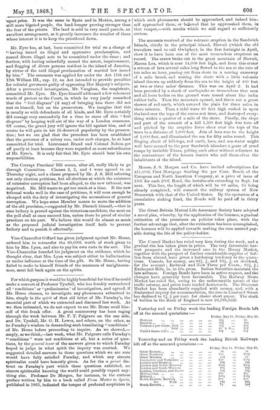For which purpose it would be highly beneficial for him
if he could quake a convert of Professor Tyndall, who has frankly surrendered
ll ' conditions' or ' preliminaries' of investigation, and agreed, if Mr. Home chooses, to investigate any phenomena submitted to him, simply in the spirit of that old letter of Mr. Faraday's, the -essential part of which we extracted and discussed last week. As we then intimated, we do not expect to see Mr. Home avail him- self of this frank offer. A great controversy has been raging through the week between Mr. F. T. Palgrave on the one side, and Dr. Tyndall, Mr. G. H. Lewes, and others, on the other, as to Faraday's wisdom in demanding such humiliating " conditions " of Mr. Home before proceeding to inquire. As we showed,— amply, as we think;—last week, what Mr. Palgrave calls Faraday's -1" conditions " were not conditions at all, but a series of ques- tions, by the general tenor of the answers given to which Faraday toped to judge in what spirit the inquiry was courted. We suggested detailed answers to those questions which we are sure would have fully satisfied Faraday, and which any sincere spiritualist could have honestly given. As for the a priori dis- trust on Faraday's part which these questions exhibited, no sincere spiritualist knowing the world could possibly expect any- thing else. Professor De Morgan, for instance, in the curious preface written by him to a book called From Matter to Spirit, published in 1863, indicated the temper of profound scepticism in
which such phenomena should be approached, and indeed him- self approached them, or believed that he approached them, in that temper,—with results which we still regard as sufficiently curious.


































 Previous page
Previous page